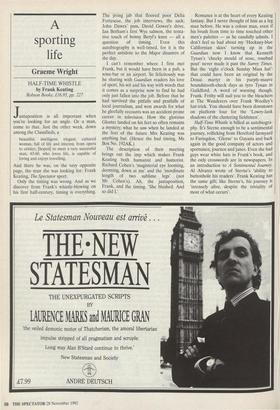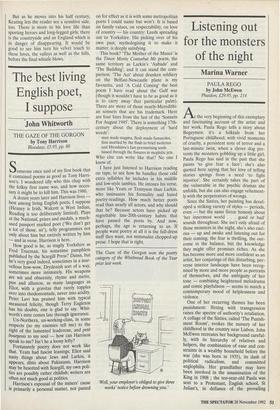A sporting life
Graeme Wright
HALF-TIME WHISTLE by Frank Keating Robson Books, £16.95, pp. 227 Juxtaposition is all important when you're looking for an angle. Or a man, come to that. Just the other week, down among the Classifieds, a
beautiful, intelligent, elegant, cultured woman, full of life and interest, from opera to cricket, [hoped] to meet a very successful man, 43-60, who loves life, is capable of loving and enjoys travelling.
And there he was, on the very opposite page, the man she was looking for: Frank Keating, The Spectator sport.
Only the timing was wrong. And as we discover from Frank's whistle-blowing on his first half-century, timing is everything. The jiving jab that floored poor Delia Fortescue, the job interviews, the sack; John Dawes' pass, David Gower's drive, Ian Botham's first Wye salmon, the tenta- tive touch of bonny Beryl's knee — all a question of timing. Even this autobiography is well-timed, for it is the perfect antidote to the Major disasters of the day.
I can't remember where I first met Frank, but it would have been in a pub, a wine-bar or an airport. So felicitously was he sharing with Guardian readers his love of sport, his wit and his way with words that it comes as a surprise now to find he had only just fallen into the job. Before that he had survived the pitfalls and pratfalls of local journalism, and won awards for what he gleefully recounts was an accident-prone career in television. How the glorious Gloster landed on his feet so often remains a mystery; what he saw when he landed at the feet of the future Mrs Keating was anything but. (Hence the bad timing, Ms Box No. 192AK.) The description of their meeting brings out the imp which makes Frank Keating both humanist and humorist. Richard Cohen's 'magisterial eye looming, dooming, down at me' and the 'inordinate length of two sublime legs' (not Mr Cohen's). Ah, the juxtaposition, Frank, and the timing. 'She blushed. And so did I.' Romance is at the heart of every Keating fantasy. But I never thought of him as a leg man before. He was a colour man, even if his brush from time to time touched other men's palettes — as he candidly admits. I don't feel so bad about my `Hockney-blue Californian skies' turning up in the Guardian now I know that Kenneth Tynan's 'cheeky mould of nose, rosebud pout' never made it past the Surrey Times. But the 'eight o'clock Sunday Mass hat': that could have been an original by the Douai martyr in his purply-mauve houndstooth-check days as tyro Tynan in Guildford. A word of warning though, Frank. Frithy will nail you to the bleachers at The Wanderers over Frank Woolley's hat-trick. You should have been downtown on platform four for the 'Lowry-lank shadows of the clustering fieldsmen'.
Half-Time Whistle is billed as autobiogra- phy. It's Sterne enough to be a sentimental journey, rollicking from Hereford farmyard to Faringdon, `Glorse' to Guyana and back again in the good company of actors and sportsmen, journos and janes. Even the bad guys wear white hats in Frank's book, and the only crosswords are in newspapers. In an introduction to A Sentimental Journey, Al Alvarez wrote of Sterne's 'ability to buttonhole his readers'. Frank Keating has the same gift; like Sterne's, his journey is `intensely alive, despite the triviality of most of what occurs'. But as he moves into his half century, Keating lets the reader see a sensitive side, too. There is more to his love life than sporting heroes and long-legged girls; there is the countryside and an England which is in danger of disappearing. It would be good to see him turn his velvet touch to these loves, the valleys as well as the hills, before the final whistle blows.











































































 Previous page
Previous page